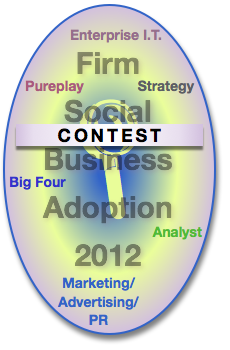 Advisory and Services Firm Social Business Adoption 2012 is publishing as individual Executive Summaries of firm category reports. These discuss relative scores of firms in each category, but they don’t disclose scores themselves. This enables us to have some fun. You can guess the highest scores in several categories and win valuable prizes! Advisory and Services Firm Social Business Adoption 2012 is publishing as individual Executive Summaries of firm category reports. These discuss relative scores of firms in each category, but they don’t disclose scores themselves. This enables us to have some fun. You can guess the highest scores in several categories and win valuable prizes!
Contest Rules
To be eligible for 1st, 2nd or 3rd prizes, all you need do is respond to four questions via the embedded survey below. You could win an Extended Analysis report of any firm in this Research Survey, or even commission your own Extended Analysis report! For five minutes of your time.
I will award prizes two days after the last Executive Summary publishes (see the Research Survey microsite for dates). However, the first person who responds with the correct answer wins that prize. This introduces some risk for people who just wait until the end! You should also know that I reserve the right to change any of the rules or prizes without notice except on this […]
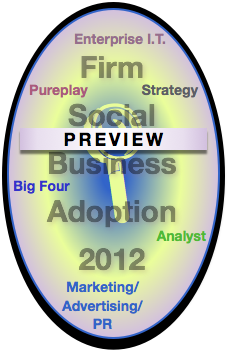 Advisory and Services Firm Social Business Adoption 2012 audits the maturity of management consultancies’ and agencies’ social business practices. It aims to serve CEOs and CMOs who want to maximize the potential value of social business by evolving their organizations. Similarly, it will be useful to firm and agency executives that want to position themselves as strong players in the growing market for social business strategy. Advisory and Services Firm Social Business Adoption 2012 audits the maturity of management consultancies’ and agencies’ social business practices. It aims to serve CEOs and CMOs who want to maximize the potential value of social business by evolving their organizations. Similarly, it will be useful to firm and agency executives that want to position themselves as strong players in the growing market for social business strategy.
This research survey may be unique because it focuses its evaluation on firms’ ability to advise clients on becoming more social by transforming their organizations. It attempts to factor out “social media promotion” since it is usually driven by marketing, not relationship. In addition, this survey quantitatively measures firms’ social business commitment; firms that don’t practice social business themselves cannot be credible advisors.
The Advisory and Services Firm Social Business Adoption 2012 microsite has all information pertaining to the research survey.
[…]
![Social Media Upgrade [Social Business Team Building] case1](http://rollyson.net/wp-content/uploads/2013/04/sbtb1.png) [Updated] The Social Media Upgrade applies to most consumer-oriented brands that have been outsourcing much of their social media work to agencies. In 2013, digital marketing and brand executives are thinking about building their internal teams to provide more continuity and scale. [Updated] The Social Media Upgrade applies to most consumer-oriented brands that have been outsourcing much of their social media work to agencies. In 2013, digital marketing and brand executives are thinking about building their internal teams to provide more continuity and scale.
Social Media Upgrade is the first of the five-part social business team building series The series describes team building in the context of various scenarios in which firms build social business capability, step by step, while investing wisely. Social Business Strategy Use Cases outlines and compares all five use cases while Social Business Team Building gives general guidance for how to create social business teams as well as recommendations for what characteristics leaders have, so I recommend reading them, too.
[…]
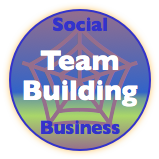 [UPDATED] Several times over the past few years, I have been contacted by major brands to advise them on finding a “social media executive” to help them “figure out social media” and “create a strategy.” In 2012, many firms began building social media teams in earnest, and this trend will continue to grow in the years ahead. Firms are also bringing “social media work” inside after having outsourced it to agencies. All of my client work has involved helping clients to build social business competency and teams, so here I’ll offer some pointers for how to build teams and avoid the pitfalls most companies experience. [UPDATED] Several times over the past few years, I have been contacted by major brands to advise them on finding a “social media executive” to help them “figure out social media” and “create a strategy.” In 2012, many firms began building social media teams in earnest, and this trend will continue to grow in the years ahead. Firms are also bringing “social media work” inside after having outsourced it to agencies. All of my client work has involved helping clients to build social business competency and teams, so here I’ll offer some pointers for how to build teams and avoid the pitfalls most companies experience.
Although each organization’s culture is different, the CEO, CDO, CMO or CAO will be happier with the social business investment if s/he doesn’t invest far ahead of return on investment, which remains low at firms that insist on “business-meaningful” metrics, not the PR- or “brand-building” variety. It’s a chicken-and-egg challenge: how do you know what kind of team to build until you’re achieving real business-meaningful returns on your social business initiatives?
[…]
Unusual strategy & management guide shows how to use social data to solve complex problems 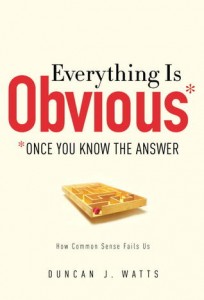 Book Review: Everything Is Obvious* Once You Know the Answer/Duncan J. Watts Book Review: Everything Is Obvious* Once You Know the Answer/Duncan J. Watts
Everything Is Obvious* is an excellent how-to guide to understanding how social networks change strategy, prediction and decision-making. It offers practical techniques and profound insights for using social networks, big data and new ways of thinking to solve complex problems in business and government.
Intriguingly, the book also cites research that debunks several social media sacred cows.
Watts has an interesting point of view because he combines several disciplines: he began his career as a physicist before moving into sociology, so he strives to combine the quantitative, experimental methods of physics with maddeningly complex social problems. Moreover, he’s been running practical experiments at Yahoo! for several years, using search, Web and social data. Watts backs up his assertions with primary research that he has led or in which he has participated. He is also a very engaging writer.
I also highly recommend “Obvious” because it enables […]
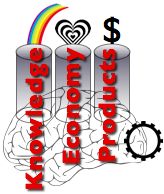 [UPDATED] Several profound market forces are preparing the ascendancy of Knowledge Economy products, which result from collaboration among designers, artists, engineers, customers and firms. This represents one of the Knowledge Economy’s most exciting-yet-disruptive elements: “products” will cease to be dominated by monolithic factories that mass produce virtually all items that people use and consume. Moreover, people have an inherent joy when they can make things for themselves, their friends and their families—and a dramatic new wave of creativity and innovation is imminent. To help you wrap your mind around Knowledge Economy products, this post will recall what happened to mass media and entertainment industries. [UPDATED] Several profound market forces are preparing the ascendancy of Knowledge Economy products, which result from collaboration among designers, artists, engineers, customers and firms. This represents one of the Knowledge Economy’s most exciting-yet-disruptive elements: “products” will cease to be dominated by monolithic factories that mass produce virtually all items that people use and consume. Moreover, people have an inherent joy when they can make things for themselves, their friends and their families—and a dramatic new wave of creativity and innovation is imminent. To help you wrap your mind around Knowledge Economy products, this post will recall what happened to mass media and entertainment industries.
Knowledge Economy products are conceived, designed, prototyped and fabricated in the Social Channel. Best practices in open source, Agile development, design and Web development will unleash continuous innovation at a scale and pace we’ve never seen before. Knowledge and innovation will be free in the Knowledge Economy because all supporting processes will become an order of magnitude faster and cheaper. Firms and brands that do not recognize and respond quickly enough will become irrelevant.
Most brands […]
 Branch disruption enables unusual opportunity for bank executives who consider transforming their relationships with clients. More generally, retail banking provides an excellent example of an Industrial Economy industry whose services are facing commoditization and weakening profits due to the waning of the Productized Channel of Value. In 2013, bank branch networks are under intense scrutiny because they are expensive, and client visits have been falling steadily for several years as e-banking and m-banking adoption have accelerated. Astute banks will use branches to transform their client relationships by leveraging the Social Channel. Here’s how they will do it. Branch disruption enables unusual opportunity for bank executives who consider transforming their relationships with clients. More generally, retail banking provides an excellent example of an Industrial Economy industry whose services are facing commoditization and weakening profits due to the waning of the Productized Channel of Value. In 2013, bank branch networks are under intense scrutiny because they are expensive, and client visits have been falling steadily for several years as e-banking and m-banking adoption have accelerated. Astute banks will use branches to transform their client relationships by leveraging the Social Channel. Here’s how they will do it.
[…]
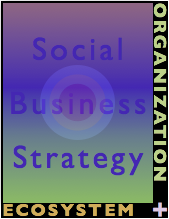 The social business Organization Audit serves as the second half of the due diligence process that is the foundation of the social business strategy. The first part is the ecosystem audit by which the firm has assessed the external digital world that’s relevant to its business. However, this is only half the picture: now we need to assess the firm’s capabilities to engage the ecosystem, so this is an internal analysis. The social business Organization Audit serves as the second half of the due diligence process that is the foundation of the social business strategy. The first part is the ecosystem audit by which the firm has assessed the external digital world that’s relevant to its business. However, this is only half the picture: now we need to assess the firm’s capabilities to engage the ecosystem, so this is an internal analysis.
By conducting external and internal due diligence, we arrive at a social business strategy that optimizes the what the ecosystem values most highly with the firm’s ability to deliver. The social business strategy marries the ecosystem audit with the organization audit to determine optimal sharing scenarios (pilots).
The social business Organization Audit begins with a basic core competency analysis, drills down to stakeholder issues & actions and synthesizes these steps into several “trial pilots” that it will then vet through several other steps: social business good practices uses the ecosystem as a filter to learn from other firms’ similar initiatives, resource analysis gauges […]
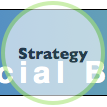 When CSRA released the Social Network Roadmap in Q2 2008, we were a unique voice speaking at conferences about enterprise adoption. Due to my prior work helping enterprises adopt disruptive technologies like distributed computing, Web applications, service-oriented architecture and Web services, it was easy to see what enterprise adoption would look like, so I designed Social Network Roadmap several years before most of the market was ready to use it. Our client work has enabled us to test, tweak and expand the roadmap since then. As 2012 draws to a close, enterprises have experimented, adoption of social technologies (“social media”) among most stakeholders has set records, and executives wonder how they can coordinate social business across the enterprise. To realize “compounded” enterprise social business benefits it’s important to understand the social business life cycle, so here is a brief treatment. When CSRA released the Social Network Roadmap in Q2 2008, we were a unique voice speaking at conferences about enterprise adoption. Due to my prior work helping enterprises adopt disruptive technologies like distributed computing, Web applications, service-oriented architecture and Web services, it was easy to see what enterprise adoption would look like, so I designed Social Network Roadmap several years before most of the market was ready to use it. Our client work has enabled us to test, tweak and expand the roadmap since then. As 2012 draws to a close, enterprises have experimented, adoption of social technologies (“social media”) among most stakeholders has set records, and executives wonder how they can coordinate social business across the enterprise. To realize “compounded” enterprise social business benefits it’s important to understand the social business life cycle, so here is a brief treatment.
[…]
How to Outperform by Managing the Social Business Risks that Slow Your Competitors
 By understanding the dirty dozen social business risks, you can make fewer mistakes than your rivals and get more done for less money, so this may be one of the most valuable posts you read this year. Having advised executives in adopting disruptive technology since the 1980s, I have learned that hidden assumptions sabotage early adopters’ investments and delay desired business outcomes. Happily, early adopters can significantly diminish social business risks by looking for them and mitigating them with agile development methodologies. CSRA’s client work has shown that using a risk mitigation approach is the most effective way to increase social business return on investment. By understanding the dirty dozen social business risks, you can make fewer mistakes than your rivals and get more done for less money, so this may be one of the most valuable posts you read this year. Having advised executives in adopting disruptive technology since the 1980s, I have learned that hidden assumptions sabotage early adopters’ investments and delay desired business outcomes. Happily, early adopters can significantly diminish social business risks by looking for them and mitigating them with agile development methodologies. CSRA’s client work has shown that using a risk mitigation approach is the most effective way to increase social business return on investment.
[…]
|
|
 Advisory and Services Firm Social Business Adoption 2012 is publishing as individual Executive Summaries of firm category reports. These discuss relative scores of firms in each category, but they don’t disclose scores themselves. This enables us to have some fun. You can guess the highest scores in several categories and win valuable prizes!
Advisory and Services Firm Social Business Adoption 2012 is publishing as individual Executive Summaries of firm category reports. These discuss relative scores of firms in each category, but they don’t disclose scores themselves. This enables us to have some fun. You can guess the highest scores in several categories and win valuable prizes!
 Advisory and Services Firm Social Business Adoption 2012 audits the maturity of management consultancies’ and agencies’ social business practices. It aims to serve CEOs and CMOs who want to maximize the potential value of social business by evolving their organizations. Similarly, it will be useful to firm and agency executives that want to position themselves as strong players in the growing market for social business strategy.
Advisory and Services Firm Social Business Adoption 2012 audits the maturity of management consultancies’ and agencies’ social business practices. It aims to serve CEOs and CMOs who want to maximize the potential value of social business by evolving their organizations. Similarly, it will be useful to firm and agency executives that want to position themselves as strong players in the growing market for social business strategy.![Social Media Upgrade [Social Business Team Building] case1](http://rollyson.net/wp-content/uploads/2013/04/sbtb1.png) [Updated] The Social Media Upgrade applies to most consumer-oriented brands that have been outsourcing much of their social media work to agencies. In 2013, digital marketing and brand executives are thinking about building their internal teams to provide more continuity and scale.
[Updated] The Social Media Upgrade applies to most consumer-oriented brands that have been outsourcing much of their social media work to agencies. In 2013, digital marketing and brand executives are thinking about building their internal teams to provide more continuity and scale. [UPDATED] Several times over the past few years, I have been contacted by major brands to advise them on finding a “social media executive” to help them “figure out social media” and “create a strategy.” In 2012, many firms began building social media teams in earnest, and this trend will continue to grow in the years ahead. Firms are also bringing “social media work” inside after having outsourced it to agencies. All of my client work has involved helping clients to build social business competency and teams, so here I’ll offer some pointers for how to build teams and avoid the pitfalls most companies experience.
[UPDATED] Several times over the past few years, I have been contacted by major brands to advise them on finding a “social media executive” to help them “figure out social media” and “create a strategy.” In 2012, many firms began building social media teams in earnest, and this trend will continue to grow in the years ahead. Firms are also bringing “social media work” inside after having outsourced it to agencies. All of my client work has involved helping clients to build social business competency and teams, so here I’ll offer some pointers for how to build teams and avoid the pitfalls most companies experience. Book Review: Everything Is Obvious* Once You Know the Answer/Duncan J. Watts
Book Review: Everything Is Obvious* Once You Know the Answer/Duncan J. Watts  [UPDATED] Several profound market forces are preparing the ascendancy of Knowledge Economy products, which result from collaboration among designers, artists, engineers, customers and firms. This represents one of the Knowledge Economy’s most exciting-yet-disruptive elements: “products” will cease to be dominated by monolithic factories that mass produce virtually all items that people use and consume. Moreover, people have an inherent joy when they can make things for themselves, their friends and their families—and a dramatic new wave of creativity and innovation is imminent. To help you wrap your mind around Knowledge Economy products, this post will recall what happened to mass media and entertainment industries.
[UPDATED] Several profound market forces are preparing the ascendancy of Knowledge Economy products, which result from collaboration among designers, artists, engineers, customers and firms. This represents one of the Knowledge Economy’s most exciting-yet-disruptive elements: “products” will cease to be dominated by monolithic factories that mass produce virtually all items that people use and consume. Moreover, people have an inherent joy when they can make things for themselves, their friends and their families—and a dramatic new wave of creativity and innovation is imminent. To help you wrap your mind around Knowledge Economy products, this post will recall what happened to mass media and entertainment industries. Branch disruption enables unusual opportunity for bank executives who consider transforming their relationships with clients. More generally, retail banking provides an excellent example of an Industrial Economy industry whose services are facing commoditization and weakening profits due to the waning of the Productized Channel of Value. In 2013, bank branch networks are under intense scrutiny because they are expensive, and client visits have been falling steadily for several years as e-banking and m-banking adoption have accelerated. Astute banks will use branches to transform their client relationships by leveraging the Social Channel. Here’s how they will do it.
Branch disruption enables unusual opportunity for bank executives who consider transforming their relationships with clients. More generally, retail banking provides an excellent example of an Industrial Economy industry whose services are facing commoditization and weakening profits due to the waning of the Productized Channel of Value. In 2013, bank branch networks are under intense scrutiny because they are expensive, and client visits have been falling steadily for several years as e-banking and m-banking adoption have accelerated. Astute banks will use branches to transform their client relationships by leveraging the Social Channel. Here’s how they will do it. By understanding the dirty dozen social business risks, you can make fewer mistakes than your rivals and get more done for less money, so this may be one of the most valuable posts you read this year. Having advised executives in adopting disruptive technology since the 1980s, I have learned that hidden assumptions sabotage early adopters’ investments and delay desired business outcomes. Happily, early adopters can significantly diminish social business risks by looking for them and mitigating them with agile development methodologies. CSRA’s client work has shown that using a risk mitigation approach is the most effective way to increase social business return on investment.
By understanding the dirty dozen social business risks, you can make fewer mistakes than your rivals and get more done for less money, so this may be one of the most valuable posts you read this year. Having advised executives in adopting disruptive technology since the 1980s, I have learned that hidden assumptions sabotage early adopters’ investments and delay desired business outcomes. Happily, early adopters can significantly diminish social business risks by looking for them and mitigating them with agile development methodologies. CSRA’s client work has shown that using a risk mitigation approach is the most effective way to increase social business return on investment.